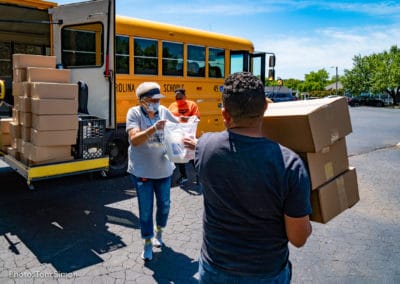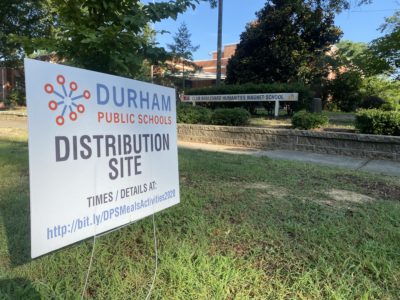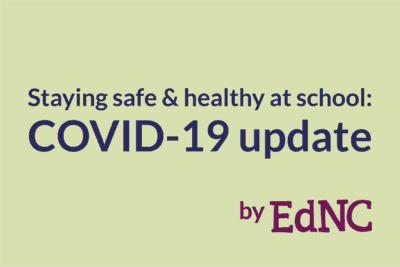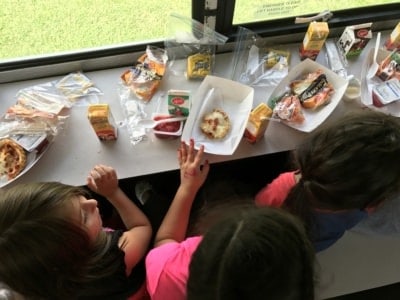

Editor’s note: On Friday, Oct. 9, the USDA announced that it is extending flexibilities to allow free meals to continue to be available to all children throughout the entire 2020-2021 school year. Read more here.
On a Monday morning in late July, Thomasville City Schools served free summer meals to almost 11,500 children — five times the district’s enrollment.
That was made possible by the flexibilities granted under the Summer Food Service Program (SFSP) — a federally-funded, state-administered program that provides reimbursements from the U.S. Department of Agriculture (USDA) for any free meal served to a child age 18 and under.
A federal waiver from the USDA that allowed the Summer Food Service Program to operate amid the COVID-19 pandemic was set to expire on Aug. 31. But to the relief of many school nutrition administrators and child nutrition advocates, the USDA announced yesterday that several flexibilities will be extended through as late as Dec. 31, 2020.
“During the COVID-19 pandemic, USDA has provided an unprecedented amount of flexibilities to help schools feed kids through the school meal programs, and today, we are also extending summer meal program flexibilities for as long as we can, legally and financially,” said USDA Secretary Sonny Perdue in a press release.
The flexibility to serve free meals to all children under the SFSP is crucial to the ability of school nutrition departments to meet the increased demand brought on by the COVID-19 pandemic. A June report from Northwestern University analyzed national Census Bureau data and found that food insecurity has doubled overall and tripled among households with children. And a July report from No Kid Hungry found that 47% of American families live with hunger — with even higher rates among Black (53%) and Hispanic (56%) families.
The specifics of the waivers
The nationwide waivers will allow any child age 18 and under to receive free meals from schools and community sites operating under the SFSP and the Seamless Summer Option (SSO). The waivers will run through the end of 2020, or until available funding runs out. According to a USDA press release, specifics of the waivers include:
- Allowing SFSP and SSO meals to be served in all areas and at no cost
- Permitting meals to be served outside of the typically-required group settings and meal times
- Waiving meal pattern requirements as necessary
- Allowing parents and guardians to pick-up meals for their children
Without these extensions, school districts would have to revert back to serving meals under the National School Lunch Program (NSLP) and School Breakfast Program (SBP), which have more restrictions than the SFSP.
Under those programs, school districts would no longer be able to serve every child free meals. Instead, they would have to confirm which students are enrolled in the district.
Mary-Catherine Talton, director of school nutrition for Wilson County Schools and legislative chair for the School Nutrition Association of North Carolina, gave the example of a mom who’s been picking up free meals for her 3-year old, 5-year old, and 10-year-old since March when school buildings first closed. The 3 and 5-year old are not enrolled in the district because they’re too young. Without the extension of these waivers, the district would have had to discontinue service to the 3 and 5-year-old.
Students would also have to be checked for eligibility for free, reduced-price, or paid meals, and payments would have to be collected. In some cases, students would have had to pick up meals from the school they were enrolled in rather than any meal site. That means parents might have had to make multiple stops across the district.
“We are in a time when families are in more need than ever, yet, we were going to have to start requesting money for those meals again if they did not qualify for the free or reduced meal,” said Talton.
These changes would have made it more difficult to distribute meals, especially through pick up sites and deliveries. Talton said the waivers expiring would have put an administrative strain on her department and a financial strain on families.
“Whether it’s hybrid, in the classroom, or remote learning … we’re able to meet them where they are without all the red tape burden that (the waivers expiring) was going to bring,” she said.
Awaiting guidance, districts switch programs
Julie Pittman, education outreach manager for No Kid Hungry, said the extension of the waivers will help schools and community organizations reach hungry kids in the fall. But she also believes the waivers should be extended for the entire 2020-21 school year to address increasing rates of childhood hunger and to prevent school districts from the administrative burden of switching between programs.
That burden is playing out in school districts across the state this week. According to Pittman, the USDA has not yet provided guidance to state agencies regarding the implementation of the extended waivers, leaving districts in limbo.
“We do expect that guidance to come out later this week, but in the meantime, what that means is schools and agencies are going to have to operate under the National School Lunch Program,” said Pittman. “It’s going to mean that there are going to be several kids that go hungry because the guidance on the waivers hasn’t come out yet.”
In preparing for the waivers to expire, Pittman said that many school districts sent messages out last week telling parents about changes to school meals that would kick in this week. For example, students have to be present, provide their student ID, and pay for meals unless they are on free- or reduced-price plans.
“That is going to create an unfathomable burden on so many parents,” said Pittman. “The hope is that in the very near future things can go back to the way that they have been operating so that we can feed the most kids with the least amount of obstacles.”
And this scenario isn’t just happening in North Carolina — it’s affecting school districts across the country who have switched to the National School Lunch Program is anticipation of the waivers expiring.
“Children will go hungry this week,” said Pittman. “Getting food to kids who need it is just one additional way that schools and community organizations are keeping things as close to normal as they can, and they are right now not going to be able to do that until we get the guidance on the waiver.”
Looking ahead
In the weeks and months leading up to Aug. 31, child nutrition advocates focused their efforts on extending the USDA waivers. No Kid Hungry launched a website where individuals could send messages to the USDA asking that they extend the waivers. The Carolina Hunger Initiative launched a page that shares quotes from school nutrition administrators on the “need to continue offering free meals to all children.”
Now that the waivers have been extended through December, organizations like the School Nutrition Association are focusing their efforts on getting the waivers extended through the entire school year and getting funding from Congress to cover costs associated with COVID-19 and the operation of school meals moving forward.
The press release from the USDA states that waivers have not yet been extended through the entire school year because the agency is “obligated to not spend more than is appropriated by Congress.” Using data from April, the USDA determined that it could only offer the extensions through the end of the year.
Reflecting on the the work that led to the waivers being extended, Pittman said there is no greater advocate in the country for school nutrition than Lynn Harvey, chief of child nutrition services for the state Department of Public Instruction.
“She has advocated on a daily basis with people in power, with decision makers, with people in our own state and in the national government, in order to try to make sure that not only every kid in North Carolina has the opportunity and access to free school meals, but that every kid in the country does,” said Pittman. “Without her leadership in North Carolina, I believe in my heart that this waiver extension would not have happened for the entire country.”






